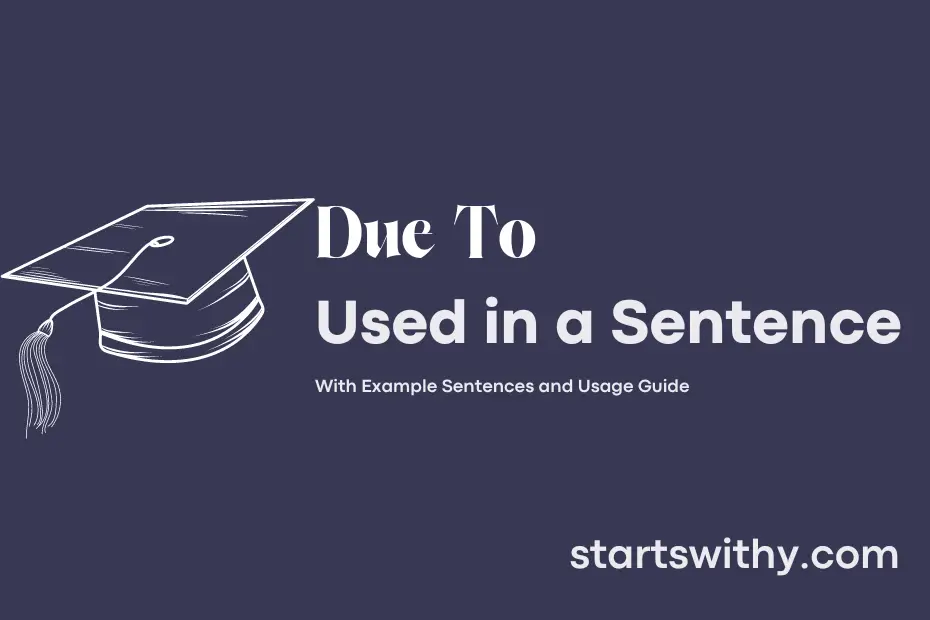Confusion often arises around the use of “due to” in sentences. This common phrase is typically used to indicate the cause of a particular result.
In the English language, “due to” is used to show the reason behind a certain outcome, linking the cause and effect in a sentence. Understanding how to properly use “due to” can significantly enhance the clarity and coherence of your writing.
7 Examples Of Due To Used In a Sentence For Kids
- Due to heavy rain, the children played inside today.
- The school picnic was canceled due to bad weather.
- Due to a power outage, the classroom was dark.
- The teacher arrived late due to traffic congestion.
- Due to a holiday, there was no school today.
- The field trip was postponed due to unforeseen circumstances.
- Due to a school event, classes ended early.

14 Sentences with Due To Examples
- Due to heavy rain, the college picnic has been postponed.
- Due to some technical issues, the wifi connection in the library is not working.
- Due to the ongoing strike, several classes have been cancelled.
- Due to insufficient attendance, the cultural event has been cancelled.
- Due to a power outage, the scheduled exam has been rescheduled.
- Due to the delay in printing, the course materials will be distributed next week.
- Due to a sudden illness, the guest lecture has been postponed.
- Due to the lack of volunteers, the college fest committee is in need of help.
- Due to a miscommunication, the submission deadline has been extended.
- Due to limited seating, students are advised to arrive early for the seminar.
- Due to unforeseen circumstances, the sports meet has been shifted to the following week.
- Due to a faculty training session, classes will be postponed for the day.
- Due to ongoing maintenance work, the college canteen will remain closed tomorrow.
- Due to the strike by public transport workers, some students may face difficulty in commuting to campus.

How To Use Due To in Sentences?
Due to is a phrase often used to show the reason or cause of something. Due to should be followed by a noun or gerund to complete the sentence. For example, “The game was canceled due to rain” or “She missed the meeting due to traffic.”
When using due to, it’s important to keep in mind that it is typically used in formal or written communication. In spoken English, it may be more common to use phrases like “because of” or “on account of.”
To use due to correctly in a sentence, remember to place it immediately before the noun or gerund that explains the cause or reason for the outcome. For instance, “The flight was delayed due to mechanical issues.”

Avoid using due to with a verb after it, as this can lead to a grammatically incorrect sentence. For example, saying “The game was canceled due to raining” is incorrect.
In summary, remember that due to is used to explain the cause of a situation, so it should be followed by a noun or gerund. Keep your sentences clear and concise by using due to appropriately in your writing.
Conclusion
In conclusion, the use of “due to” in sentences indicates a cause-and-effect relationship, explaining the reason or cause of a certain outcome. It is commonly used to introduce the reason behind a certain situation or occurrence. For example, “The flight was delayed due to bad weather” clearly states that the bad weather caused the delay.
Understanding how to properly use “due to” in sentences can help in clearly expressing the causal relationship between events or conditions. It is essential to use this phrase correctly to avoid ambiguity and ensure that the intended meaning is conveyed accurately. By mastering the usage of “due to,” writers and speakers can effectively communicate the reasons behind various circumstances in a concise and precise manner.



